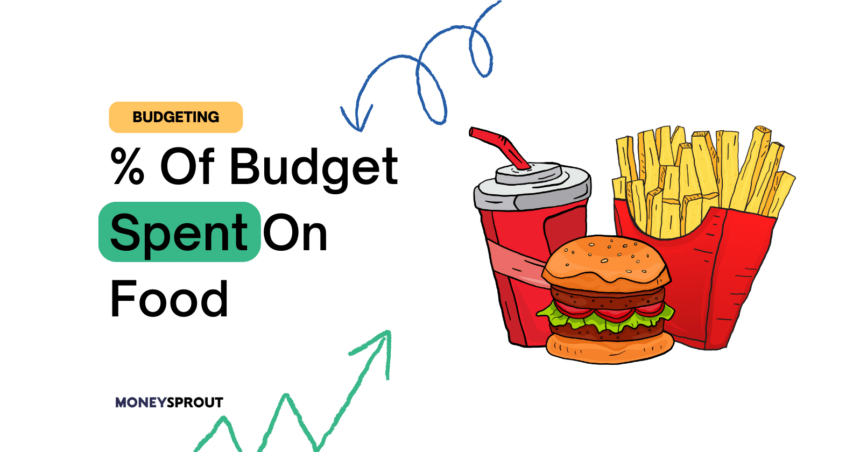Groceries are undoubtedly getting more expensive in the UK. Seemingly every time you walk into the shop something has increased in price. This is squeezing people’s budgets tighter than ever. In this article, we’re going to look at how much you should be spending on food and what percentage of your income you should be allocating to it.
Quick Overview
As an individual, you should aim to spend around 10-15% of your monthly income on food and non-alcoholic drinks. According to the latest ONS Data from 2022, we spend on average 11.8% of our total income on food and non-alcoholic drinks.
What Is The Average Weekly Grocery Spend
For an individual, the average food bill is £44.70 per week. This includes £34.50 for groceries and £10.20 for eating out. This also does not include any alcoholic drinks which are more expensive.
For families of 2 Adults and 2 children, the average weekly spend is £167.40. This includes £129.20 for groceries and £38.20 for eating out.
These are averages and don’t represent the whole picture very well. Higher earners may spend a smaller percentage of their income on food while spending significantly more in absolute amounts. Lower earners are likely to be spending a larger percentage of their income on food than higher earners.
What Percentage Of Your Income Should Go Toward Groceries
Financial advisors recommend people spend between 10-15% of their income on food. This falls within the 50/30/20 category for Needs/Wants/Savings. The needs category would break down to roughly 30% rent/home, 10% food, and 10% other bills. However, on a lower income, this category is going to balloon into your wants category very quickly.
For someone earning £50k per year 10-15% is reasonable. After tax that would give you roughly £310 – £465 to spend on food each month. That’s a considerable amount and most people could get by on much less by cooking at home.
However, if you are earning £25k per year it equates to around £175 per month on food and eating out. This puts you slightly below the average of roughly £193 per month. You most likely will not be doing much eating out or eating premium food on a budget of £175 per month.
So, how much of your income you spend on food will depend on your current income. If your higher income, you can get away with spending a much lower portion of your total income whereas if you’re on the lower end, food is going to eat into your budget much more.
In 2021, the average spend on food was only 8.7% whereas it rose to 11.8% in 2022 and is expected to be even higher when we get the 2023 numbers. Cutbacks will have to be made elsewhere in your budget to make way for the rising price of food.
Why Are Food Prices Higher Than Ever In The UK?
Food prices are rising due to multiple reasons in the UK:
- Increased energy costs caused by Russia’s invasion of Ukraine
- Supply chain disruption due to COVID & Brexit
- Bad weather affecting harvests
- Rising Labour costs
All of these factors hitting at the same time, make for a nasty rise in prices.
How To Save On Your Grocery Bills
If you’re feeling the pinch from soaring food prices, you’re in good company. Here are 12 strategies to help you trim your weekly grocery bills:
- Map Out Your Meals and Adhere to Your List: By deciding your meals in advance, you can purchase precisely what’s required, curbing unnecessary spending and waste.
- Purchase in Large Quantities: Buying products in bulk usually results in a better price per unit. Consider items like grains, pastas, beans, and other shelf-stable products.
- Choose Supermarket Own Labels: The in-house labels of many supermarkets can match the quality of renowned brands but at a more affordable rate. It’s worth a shot!
- Benefit from Loyalty Programs and Cashback Deals: A multitude of UK retailers offer loyalty programs which, over time, can lead to considerable savings. Also, scout for cashback promotions on specific apps or credit cards.
- Cut Down on Ready-to-Eat Foods: Pre-made meals and treats usually come with a steeper price tag compared to home-cooked versions. Aim to prepare food at home more often.
- Prioritise Local and In-Season Purchases: Opting for in-season goods generally means you’re getting a better deal and superior freshness. Look into frequenting local farm stands or participating in a community-supported agriculture (CSA) initiative.
- Consume Less Meat: Meat often occupies a big chunk of grocery expenses. Ponder over introducing more plant-based dishes into your weekly menu.
- Aim for Zero Food Wastage: Optimise the use of leftovers, delve into food preservation techniques, and familiarise yourself with the difference between best-before and use-by labels. The less you discard, the more you conserve.
- Hunt for Promotional Periods: Stay updated with supermarket adverts or web specials. Capitalising on discounts can majorly slash your expenditure.
- Think About Digital Grocery Shopping: This avenue curtails the temptation of unplanned purchases and permits seamless price comparisons among various items and outlets.
- Leverage Price-Matching Apps: Numerous UK-centric applications compare prices across big-name stores, guiding you to the most budget-friendly choices.
- Invest in Frozen Produce: Typically, these are less pricey than their fresh counterparts and pack similar nutritional value. Additionally, they have a longer shelf life.
- Cultivate Your Greens: Should you have any available space, even a ledge, nurturing your own greens, herbs, or veggies can be both economical and fulfilling.
- Reassess Luxury Purchases: Do you genuinely require that high-end coffee or lavish treat? More often than not, equally delightful, wallet-friendly substitutes are available.
Final Thoughts
You should now have a better idea of how much you can spend on your weekly food shop depending on your budget. If your spending significantly more than 15% try to see if you can make some of the cutbacks we have suggested above. If you are on a lower income it is likely food will eat into more of your budget than you would like, especially with the rise in cost of living.
Read More From Money Sprout:




